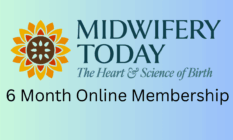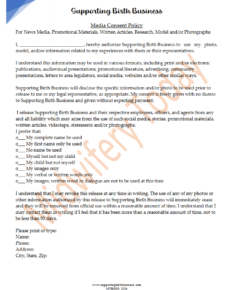
Media Reviews – Issue 125
Editor’s note: This article first appeared in Midwifery Today, Issue 125, Spring 2018.
Subscribe to Midwifery Today Magazine
 Doulas and Intimate Labor: Boundaries, Bodies, and Birth, edited by Angela N. Castañeda and Julie Johnson Searcy. 2015. (Bradford, Ontario, Canada: Demeter Press, $29.95, Kindle $14.99, 252 pages, softcover.)
Doulas and Intimate Labor: Boundaries, Bodies, and Birth, edited by Angela N. Castañeda and Julie Johnson Searcy. 2015. (Bradford, Ontario, Canada: Demeter Press, $29.95, Kindle $14.99, 252 pages, softcover.)
If a marvelous book is written and isn’t posted all over Facebook or talked about on birthing blogs does it really exist? I’m stymied that this book isn’t being discussed, shared, or debated on birthing forums, listservs, or “walls.” It certainly elicited reflections and questions as I read. With a total of 22 contributing authors, most of whom are active in the birth world, I can’t understand why their writing hasn’t fueled a lively dialogue. (I found a six-word review on Amazon and three “excellent” ratings on Goodreads.) Let’s see if I can revisit my underlined, asterisked, exclamation point-enhanced copy to create more readership for this ambitious book.
Is it a daunting book to review? Yes. Robbie Davis-Floyd took 17 pages in the book’s forward to provide a detailed summary of the 15 chapters! She did such an outstanding job that I won’t pretend I can match it in a brief review. Why is it so overwhelming? This compendium represents some serious sociological and anthropological scholarship: thousands of hours of interviews and attendance at births, dozens of questionnaires and a palpable desire to truly combine the academic and the personal. It provides real-world experiences so vividly that the theoretical is always grounded in the practical, and the voices we hear in the interview excerpts are patently real.
So what is the purpose of this multi-disciplinary effort? Recognizing that doulas represent a group that is in constant negotiation of its borders and boundaries—whether with mothers, community, or institutions—the authors explore and critically analyze doulas “as they both encounter and redefine boundaries” and, in doing so, “suggest new ways of ap-proaching maternity care and reproductive reform.” That sounds lofty to my ears, too, but chapter by chapter each ex-pert painstakingly addresses the doulas who care for women during pregnancy, labor, birth, and postpartum; through abortions, adoptions, surrogacy, miscarriage, and stillbirth; and with teens and incarcerated women. The setting may be the military, hospitals, birth centers, or homes and the clinical care might be provided by a doctor, obstetrician, midwife, or the mother herself. Doulas may be self-employed, part of a community-based effort or “radical.” In whatever context and with whichever population they work, the emphasis is on the “liminal” (from Latin limen, meaning “threshold”) aspect of their work—the need to define boundaries, coexist with the intimacy, and respect and embrace the mother’s autonomy. In her chapter, Alison Bastien beautifully, if critically, observes how to adhere to these boundaries as they occur between mother and doula. I believe it should be required reading for every doula.
In anticipation of the situations when these boundaries potentially overlap those of nurses and midwives and the opportunities for misunderstanding abound, I’d encourage reading the chapters “Cultivating Collaborative Relationships in the Provision of Labour Support: Doulas and Labour and Delivery Nurses” and “Between Two Worlds: Doula Care, Liminality and the Power of Mandorla Spaces.”
As a certified doula for over 20 years, a certified labor assistant 10 years before that, and an apprentice to an obstetri-cian/midwife for 25 years, I was astounded by how much I didn’t know until I read this book. I took nearly six months to read it, and the education was stellar. The bibliographies that accompany each chapter are a rich opportunity to delve into the literature. Some authors, such as Amy Gilliland, were old friend/colleagues whose words have guided me wisely when I worked with families as they navigated the process of transformation and grief. Some were completely new to me—like Vania Smith-Oka—whose chapter on supporting birthing mothers in a Mexican hospital I approached with trepidation and completed reading with admiration! Sarah Lewin’s chapter gave me an eye-opening perspective on body image, food, and weight that will forever alter my language and hopefully alter some of the doula “scripts” that are far too one-dimensional.
Whether you are treading this tightrope as a doula or are a homebirth midwife questioning whether doulas “smooth over” the technocratic aspects of hospital birth and slow the exodus away from institutional birth, there is much to discover about our working relationships that is frankly and openly addressed in this little volume.
Read this book and let’s begin the conversation.
—Joni Nichols
 Understanding Morning Sickness as a Gift by Jennifer Griffen. 2017. (Berkeley, CA: Spiritual Gift Institute, $12.95, 120 pages, paperback.)
Understanding Morning Sickness as a Gift by Jennifer Griffen. 2017. (Berkeley, CA: Spiritual Gift Institute, $12.95, 120 pages, paperback.)
This second book by Jennifer Griffen of the Spiritual Gift Institute is a gift to the entire birthing community. Not just for the pregnant women who experience hyperemesis gravidarum (HG), but for all birthkeepers—the midwives, doulas, and childbirth educators who work with them. While Ms. Griffen writes from first person experience—and quite a lot of it, with five pregnancies—she also brings a deeply-centered, thoroughly explored knowledge of how this syndrome affects the body/mind/spirit triad. As a midwife, I’ve seen how excruciatingly difficult HG can be. This book has helped me understand that we need to more fully explore not only other-than-medicalized treatments, but also our belief systems about its causes and effects. If you’re working in the birth world, this book is a must for you, your students, and clients.
—Deborah Simone
Joni Nichols is a childbirth educator, doula, labor assistant, activist, and partera who co-founded the pioneering waterbirth center Nacer en Plenitud, in Guadalajara, Mexico. When not working with pregnant families, making presentations, or participating in birth forums, she is reading something birth-related.
Deborah Simone LM, CPM, is chief empowerment officer at mentoringmidwives.org, dedicated to helping birthkeepers birth healthy businesses.





















